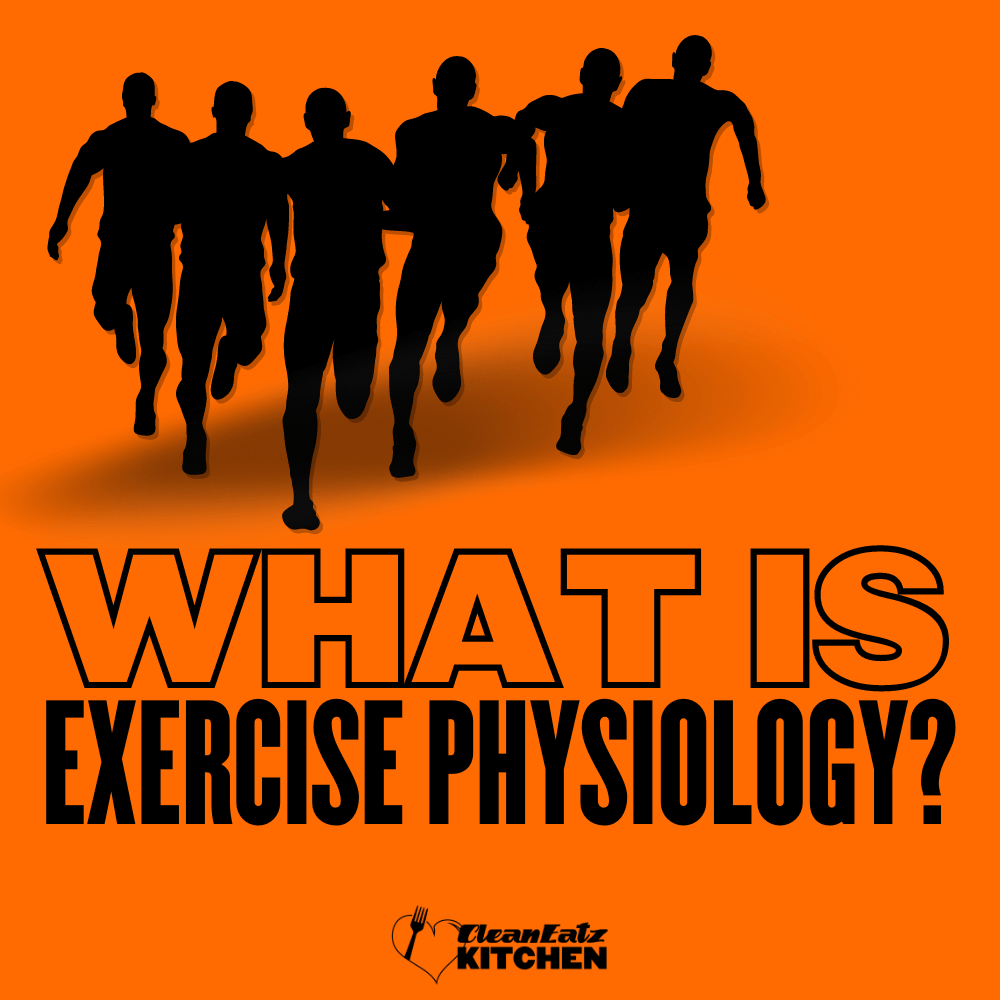
What is Exercise Physiology? A Comprehensive Guide to Body Movement & Health
Jason Nista
Exercises & Fitness
|
Healthy Lifestyle
7 minute read
Are you looking to deepen your understanding of how exercise impacts the body? "What is exercise physiology?" you might ask. It's a comprehensive field that delves into the effects of movement on our bodies.
"What is exercise physiology?" It encompasses everything from muscle development and oxygen distribution to metabolic reactions! If you're keen on discovering how top athletes maintain their performance or just intrigued about why physical activity is crucial for overall well-being, exploring research in exercise physiology can offer profound insights!
So, what is exercise physiology exactly?
Ever wondered how your body reacts to physical activity? That's what exercise physiology explores. As a subset of kinesiology, it examines the influence of exercise on human cells, tissues, organ systems, and the entire organism, down to the molecular and cellular responses in muscles.
What is exercise physiology? It's a field that scrutinizes the myriad effects when we move. It covers aspects ranging from muscle formation and oxygen circulation to diverse metabolic functions!
Exercise physiologists delve into how the body reacts to physical activity, both physiologically and psychologically. They analyze facets from muscle power to cardiovascular stamina, hormones, metabolism, oxygen intake, and beyond. The impacts of various exercises on distinct body parts, from bones to muscles, and their implications for our overall health are also focal points.
Scientists in this domain might also probe how these response mechanisms are influenced by genetic differences. At its core, understanding what is exercise physiology aids us in refining our exercise regimens and enhancing our health.
What is Exercise Physiology?
Exercise physiology delves into the physiological effects of physical activity on the human body. It examines how different forms of exercise influence various bodily components, from muscles and bones to organs and systems like the cardiovascular, digestive, and endocrine. Additionally, it considers the role of nutrition in these systems.
Why is Exercise Physiology Beneficial?
One significant advantage of understanding what is exercise physiology is its potential to guide athletes toward achieving their optimal performance. An expert in exercise physiology can design custom programs to enhance performance, considering factors like age, gender, current fitness status, medical history, and more.
By collaborating with a specialist in what is exercise physiology, athletes can fine-tune their training for maximum improvements in strength, power, endurance, speed, and agility.
Beyond athletes, understanding what is exercise physiology can also assist those aiming for better health and well-being through physical activity. It can suggest the most beneficial exercises for cardiovascular health or weight loss ambitions.
An exercise physiologist offers guidance on the correct form for exercises, nutrition, and supplementation to meet specific targets. Regular physical activity, coupled with insights from exercise physiology, promotes a healthy weight by enhancing metabolism and fat loss.
Furthermore, exercise elevates mental health by aiding in managing depression and alleviating stress. Therefore, regular workouts under the guidance of someone knowledgeable in what is exercise physiology can be a pivotal step toward maintaining our health and happiness.
Exploring the Two Main Branches of Exercise Physiology
When considering what is exercise physiology, it can be categorized primarily into sports exercise physiology and clinical exercise physiology. Acquiring knowledge in both can help optimize your health, fitness, and sports performance.
Sports Exercise Physiology
This branch of exercise physiology centers on the physical performance and wellness of athletes. Professionals in this field discern how physical activities can bolster an athlete's performance.
They also comprehend how varied training modalities impact an athlete's body in terms of composition, strength, endurance, power, flexibility, agility, speed, and coordination. Hence, they assist athletes in honing their abilities and reaching their zenith potential.
In addition to driving athletes to their best, sports exercise physiologists emphasize injury prevention. They design personalized schemes to minimize injury risks by fortifying muscles and boosting coordination. They can also frame rehabilitation strategies for athletes who have experienced sports-induced injuries or health issues.
What is Exercise Physiology in a Clinical Setting?
What is exercise physiology? At its core, it focuses on enhancing health through physical activity and lifestyle adjustments. Clinical Exercise Physiologists employ evidence-based methods to assist individuals with chronic diseases or disabilities. They enhance the quality of life by promoting physical wellness through movement therapies like aquatic therapy, Pilates, or yoga. This approach has shown effectiveness in mitigating symptoms of chronic illnesses like diabetes or heart disease. Additionally, it aids in improving mobility for those with disabilities and in reducing pain. Nutrition counseling, assessments, and evaluations are also services offered by Clinical Exercise Physiologists to ensure safe and efficient progress toward health goals.
Using What is Exercise Physiology to Achieve Fitness Goals
When wondering "what is exercise physiology?", it can be seen as a valuable tool to realize your fitness objectives. By grasping how the body reacts to exercise, a well-defined framework is at hand to make your workouts both effective and efficient. Utilizing the insights from exercise physiology, you can customize your regimen, target specific muscle groups, or enhance cardiovascular health. It also offers control over the kind of exercises and their intensities, especially when one experiences a progress plateau. In essence, it removes the uncertainties from fitness, paving the way for long-term success.
How What is Exercise Physiology Can Improve Overall Health
In answering the question, "What is exercise physiology?", it's the study of the body's responses to physical activity. This domain covers aspects from muscle strength, cardiovascular endurance, hormones, and metabolism, to oxygen uptake. Exercise physiologists guide athletes to their zenith performance by comprehending individual needs and crafting specialized plans. Regular physical activity, as informed by what is exercise physiology, is key to maintaining a healthy weight by invigorating metabolism and fat loss. Additionally, it has benefits for mental health, as it's instrumental in managing depression and alleviating stress.
Distinguishing the two main branches of "what is exercise physiology", there's the sports-focused type that zeroes in on athletes' performance and health. On the other hand, clinical exercise physiology, as previously outlined, employs evidence-backed methods to aid those with chronic ailments or disabilities through movement and therapeutic exercises.
Conclusion
"What is exercise physiology?" is a question central to understanding the intricate dynamics between exercise and the human body. As a pivotal aspect of kinesiology, exercise physiology delves deep into the physiological, cellular, and molecular reactions our bodies undergo during physical activity. Whether aiming to optimize athletic performance or improve overall health, insights from this field are indispensable. Encompassing both sports and clinical facets, exercise physiology provides tailored strategies for athletes, guides individuals with chronic conditions, and promotes a holistic approach to health and well-being.
FAQ
What exactly is exercise physiology?
Exercise physiology is the study of how the human body responds and adapts to physical activity. This includes understanding the changes at cellular, tissue, and system levels, including how muscles develop, how oxygen is distributed, and how metabolic reactions occur during various forms of exercise.
How does exercise physiology benefit athletes and non-athletes alike?
For athletes, exercise physiology offers insights into optimizing performance, enhancing endurance, power, and speed, and preventing injuries. For non-athletes, it provides valuable knowledge on how to improve overall health, manage or mitigate chronic conditions, and boost mental well-being through tailored physical activity regimes.
What's the difference between sports exercise physiology and clinical exercise physiology?
Sports exercise physiology focuses primarily on understanding and optimizing the physical performance and health of athletes. This includes how various exercises affect athletic capabilities and how to tailor training for peak performance. Clinical exercise physiology, on the other hand, emphasizes aiding individuals with chronic diseases or disabilities. It employs evidence-based methods to improve quality of life, mobility, and overall physical wellness through tailored movement therapies.
Related Articles
What Type of Exercise Is Flexibility?
6 minute read
Is Hula Hooping Good Exercise?
6 minute read



